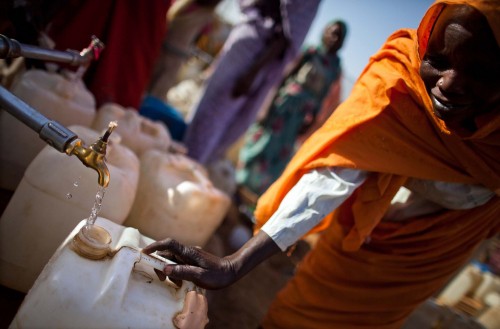Image: Women fill water cans in North Darfur. Albert González Farran / UNAMID.
One of the most influential and enduring World Development Reports ever produced – Making Services Work for Poor People – is a decade old this year.
I was among those celebrating this milestone at the World Bank last month. Aside from the thought-provoking discussions we had about the past, present and future of aid to service delivery, I was personally struck by some of the human stories behind its creation.
In particular, I was (some might say naively) surprised to find out that one of its most challenging chapters nearly didn’t make the final cut.
The author of the chapter on political accountability (Shekhar Shah) recalled how the Bank’s legal department originally resisted its foray into the historically off-limits territory of politics.
Permission was finally given only on condition the WDR team would ‘stand alone’ in the face of any political fallout.
To my mind at least, only good came from this minor victory. The chapter remains the go-to analysis for understanding why politicians so often don’t deliver on their promises, why decent quality services remain mostly elusive, and why citizens are usually powerless to do anything about it. All these issues are equally relevant today as they were then. Of course, as it turned out, the Bank’s funders were reportedly enthralled by this new realism.
Ten years on, thinking seems to have graduated from ‘does politics matter’? to ‘does politics trump everything else in service delivery’? (the title of one session at the anniversary conference). The answer on both counts: an emphatic ‘yes’.
This begs the deeper question of why, and for practitioners looking for tangible entry points, how. Specifics aside, the palpable consensus among conference participants was this: rather than casting politics as exclusively a problem – or disruption to the normal function of policy – we should consider it inherent to the everyday machinations of societies. More importantly, we should see it as part of the solution to the persistent problem of poor service delivery.
But how exactly is politics both the problem and the solution? Can it be both at the same time? Apparently so. In fact, we heard lots of examples of how politics can lurch from enabling to constraining pro-poor delivery, sometimes in the blink of an eye.
Take the case of Bihar, where political leaders have been instrumental in scaling up programmes to improve the quality of education. Nevertheless, come election time, even these progressive minds turned their attention to more visible projects that could be targeted at specific groups and were more likely to generate greater electoral returns.
It seems clear that politics is better at producing some forms of ‘progress’ than others. Expansions in access to basic services, whether it be in health, education or water, seem more achievable, politically, than improvements in quality. The explanation lies at least partly in the characteristics of these two very different objectives.
Addressing quality is complex, can challenge union interests, and produces slow, gradual improvements less easily observed by voters than, say, highly visible infrastructure. In contrast, access speaks well to a political narrative of entitlement and is unlikely to encounter resistance where it can extend political spheres of influence or scope for clientelism.
So politics can both enable and constrain. This is why no-one would dispute it’s difficult to characterise – let alone generalise – the effects of politics on service delivery in any given environment. Still, there’s something progressive and measured about moving beyond thinking of politics as the problem, to politics as the solution. It opens up the possibility of learning from the politics of what works as well as the politics of failed reforms.
Subtle as the semantics may seem, this line of enquiry also implies a slightly different orientation for aid agencies: not how they can work around politics, or even avoid it, but how they can work through it. Understanding where politics sits along this enabling-constraining continuum, and its potential to move from one to the other (and back again), may be key.
One thing the insightful anniversary conference illustrated for me was that politics – if by which we mean what issues are legitimately up for discussion and negotiation – is moveable, and it can come a long way in a decade.










